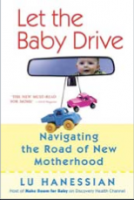
Let the Baby Drive, by Lu Hanessian (St. Martin's Press, New York, 2004)
Recently we opened a bottle of wine of far higher class (and expense) than I could hope to appreciate. (I can occasionally enjoy half of a small glass of wine, but my discernment rarely goes beyond "I like this" or "I don't like this"; I can distinguish red from white with my eyes closed, but "redolent of old oak with faint hints of chocolate, raspberry, and mushroom" is beyond me.) After my first sip or two, I said, "This isn't my kind of wine." By the third sip I had changed my mind, and thoroughly enjoyed the rest of the bottle over the next few days.
That's how I feel about Let the Baby Drive. I saw it advertised in The Compleat Mother magazine, and borrowed it from our local library. For the first several chapters I was thinking, 'Yeah, this is mildly interesting, but I wouldn't recommend it to anyone. Why does this lady make such a big deal out of life with a newborn, something women have been handling for millennia? She is 'way too focussed on herself, her angst, the minutiae of her feelings."
By the third sip I had changed my mind. I stood in awe as her son became the focus of her detailed observations. Let the Baby Drive is a rare, almost unique, look into the first few years of life. Nicholas began talking at 10 months, providing an invaluable window on the surprisingly sophisticated thought processes of children at an age when they are too often considered mere lumps of clay. Banging his spoon on his high chair tray, as every baby does, Nicholas proclaims, "Mah-mee! I'm chopping wood!"
Hanessian's habit of carefully observing Nicholas enables her to get through the stage when he hates her, doesn't need her, wants to throw her in the garbage and never see her again. Thirteen? No, three. Three years old, and dealing with terror over the knowledge that things change, people grow, water goes down the drain and you never see it again. Had she viewed this strictly as an issue of discipline, of misbehavior, instead of respecting her son enough to unravel the puzzle, she would never have known.
When Nicholas is 18 months old, she suddenly hears,
...a rhythmic crashing sound coming from down the hallway in our house. It sounds as though somebody's trying to break in. I hurry toward the bedroom to find Nicholas standing in his crib with his baby fists wrapped tightly around the railing, hurtling himself back and forth like a baby gorilla. For a second, I think I see a glint of delinquency in his eye. I see trouble. Class clown. Street kid. Jailbird. Baby behind bars. Before I can take my thoughts any further, he yells above the noise, "Mah-mee! I make muzak!" Now, the diabolical glint in his eye is more of a twinkle. Suddenly, the baby gorilla is a brilliant child turning inanimate objects into musical instruments. The mother ready to indict her baby on one count of reckless endangerment with intent to destroy private property now sees him as a budding musician.
At three, Nicholas goes to preschool, where his enthusiasm and intelligence fit poorly with the teacher's approach. After much observation, investigation, and agonized soul-searching, his parents conclude this is the wrong school, the wrong teacher, the wrong age, the wrong fit...something is wrong and the best solution is to stop. Now.
Sometimes, you can't tell what's missing until it comes back. And so it was with Nicholas in the weeks after he waved good-bye to the stone school on the hill. We didn't realize how much of his smile had faded until it was restored, until the bounce was back in his step.
Hanessian's habits of observation, and her efforts to know and understand her child, remind me of Nancy Wallace, whose books Better than School and Child's Work have long been among my favorites. Everyone knows that a child needs love; it's a rare parent (and rarer author) who understands how much he needs respect as well.
As part of their efforts to understand Nicholas's problems in preschool, his parents visited a counsellor whose wise comment is a fitting summary of this book:
The world will try again and again to turn out your son's light. It will be your responsibility to keep his light on, and to teach him how to do the same.
UPDATE March 18, 2012 Seven years? It's been seven years since I wrote this? Impossible, yet that's the date stamped on the post. At that time, our only grandchild was barely 17 months old. Now we have six grandchildren, from eight weeks to eight years, and upon re-reading Let the Baby Drive I find I love it all the more. Did I really once find the first several chapters dull, and write, "[The author] is 'way too focussed on herself, her angst, the minutiae of her feelings"? This time I hung on every word, and her inner struggles made fascinating, and important sense. Good books, like good wines, age well.


